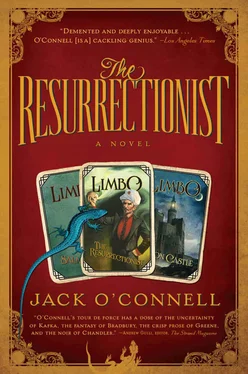Jack O'Connell - The Resurrectionist
Здесь есть возможность читать онлайн «Jack O'Connell - The Resurrectionist» весь текст электронной книги совершенно бесплатно (целиком полную версию без сокращений). В некоторых случаях можно слушать аудио, скачать через торрент в формате fb2 и присутствует краткое содержание. Год выпуска: 2009, Издательство: Algonquin Books, Жанр: Современная проза, на английском языке. Описание произведения, (предисловие) а так же отзывы посетителей доступны на портале библиотеки ЛибКат.
- Название:The Resurrectionist
- Автор:
- Издательство:Algonquin Books
- Жанр:
- Год:2009
- ISBN:нет данных
- Рейтинг книги:4 / 5. Голосов: 1
-
Избранное:Добавить в избранное
- Отзывы:
-
Ваша оценка:
- 80
- 1
- 2
- 3
- 4
- 5
The Resurrectionist: краткое содержание, описание и аннотация
Предлагаем к чтению аннотацию, описание, краткое содержание или предисловие (зависит от того, что написал сам автор книги «The Resurrectionist»). Если вы не нашли необходимую информацию о книге — напишите в комментариях, мы постараемся отыскать её.
those who create them and those who consume them. About the nature of consciousness and the power of the unknown. And, ultimately, about forgiveness and the depth of our need to extend it and receive it.
The Resurrectionist — читать онлайн бесплатно полную книгу (весь текст) целиком
Ниже представлен текст книги, разбитый по страницам. Система сохранения места последней прочитанной страницы, позволяет с удобством читать онлайн бесплатно книгу «The Resurrectionist», без необходимости каждый раз заново искать на чём Вы остановились. Поставьте закладку, и сможете в любой момент перейти на страницу, на которой закончили чтение.
Интервал:
Закладка:
This time, it took almost thirty minutes for the doctor to find that scarce and precious moment when exhaustion and sherry allowed him to fade out of the Clinic and into the place where his mind could rage against the borders of rationality. The place where, he knew from experience, the most radical breakthroughs were conceived.
Unfortunately, the doctor rarely had enough time or solitude these days to roam out into the frontier of his imagination. He was a man of staggering responsibilities. Few could know the enormity of his obligations and fewer still could discharge them. And while some mundane satisfaction derived from executing one’s duty, the cost was considerable — an ongoing sacrifice of the hours and the privacy needed to dream well and deeply.
But with his tools at hand and the right combination of sleeplessness and Manzanilla, Dr. Peck could dive down into a level of thought where language and history were increasingly irrelevant. These submersions tended to ravage him, like the pearl diver who plunges beyond all good sense in search of the ultimate gem. The pressure on the lungs and the temples becomes more severe with each additional foot of depth. The danger of dislocation more acute. The risk of remaining forever submerged, extraordinary. But Peck, like all visionaries, knew that there was no such thing as true exploration without true risk. In fact, that was where the thrill of discovery resided — in the heart of the peril. It was not work for cautious men, which is why it fell to the doctor. Whatever other traits his blood harbored, timidity was not among them.
Peck took a last long swallow of sherry and put the bottle down on the floor. He could feel himself arriving into that moment when discovery was possible. In the end, he knew, this was what he lived for: that instant of pure, galloping potential, that feeling of downrushing epiphany.
But calling forth fresh thought was, like summoning demons, a precarious process. And, for Dr. Peck, it required an instinctual blending of the right amounts of whimsy, research, fatigue, daydream, alcohol, and stress. It also required the right environment — the cupola was the only place that the notions would deign to be born. Finally, the summoning required a marriage of humility and patience that could allow the idea to reveal itself in its own manner and time. The idea, it must be understood, is always in charge.
From adolescence through the first years of his medical practice, Dr. Peck had believed that new knowledge was born of a specific process, reflection and experimentation coupling to yield results that were quantifiable, repeatable, and capable of being shared. But up here, in this womb at the top of the Clinic, in his boyhood sanctuary, he had learned otherwise. Genuine revelation, he determined, was nothing less than an explosion of new consciousness, a reconception of the mind itself. It did not accrete, building slowly and steadily upon existing information and tradition. It was, rather, a revolution and a rapture, a concussion that obliterated the past and re-created the world in the radiant light of newborn vision.
Seeking refuge from a spectral and unimpressed father and, later, a scornful and depressive wife and, later still, a daughter he loved too much, Peck had spent countless sleepless nights in the cupola, looking out over the ocean of pines and trying to dream his way into epiphany or, failing that, oblivion. Over time, the cupola had become a kind of petri dish or incubator, the glass uterus where the notions were conceived and matured. Peck had come to feel this was a place of holy asylum.
Once, years ago, Alice had found him on the window seat, calling out in his sleep, locked into one of those slow-motion nightmares in which the terror is inversely proportionate to the mundane image that triggers it. She was fourteen or so at the time, with hair trimmed short for the summer. Upon being woken, still tormented by his dreams, Peck had mistaken her for his son and struck her across the cheek. Shocked, she had dropped to her knees, eyes open and staring throughout the fall, her skin reddening with the prints of his fingers. When Peck realized his mistake, he pulled the girl into his arms and held her, too tightly, until sometime before dawn, both of them weeping with what the father wanted to believe was a shared understanding regarding the cost of genius.
On that night, Peck realized that the calling to medicine — at least the kind of visionary medicine to which he aspired — was more than a vocation; it was destiny. And as such, it called for a radical lifestyle. Doctors, like monks, were forever at risk of infiltration by the domestic world. He concluded, much too late, that they should be solitary, if not entirely celibate, creatures. A people, as the saying goes, set apart. The modern clinic, he now understood, was the contemporary monastery, its labs the chapels where communion could be reinvented perpetually. In the case of the Peck Clinic, it would be a communion with the sleepers.
On impulse, Peck reached down into the terrarium for Rene, caught the sallie gently inside his fist, and lifted it out of the glass bowl. Bringing his mouth close to his cupped hand, Peck spoke into it.
“My apologies. Did I interrupt a dream?”
The doctor’s query was nothing but a polite greeting, something to set the tone and begin the session. He knew that salamanders lived day for night. Through the latex, he could feel the newt move against his skin, a sensation he found comforting. The gloves were for the creature’s protection, certain toxins in the human epidermis being poisonous to newts.
Peck reached down with his free hand, grabbed one of the filmy brain scans and laid it on his bare chest. He placed Rene on the scan and the newt remained there, frozen, staring up into the sky of the doctor’s face.
“I won’t keep you in suspense any longer,” Peck said to Rene. “The harvest was a success. As you know, I had my doubts about the fetal source. But I feel certain now that we were within the nine-week limit.”
While it is true that salamanders are deaf to airborne sounds, the doctor was confident that his confessor received and processed the vibrations of voice in some satisfactory manner.
“The oldest irony,” Peck said. “We must go to the gutter in order to reach the stars.”
When drunk, Dr. Peck had a tendency toward the theatrical. Rene, for his part, did not seem to mind. There was little cruelty in artifice and, in small amounts, the doctor’s affectations could verge on the charming.
“Light out of darkness,” Peck intoned, like some hammy Victorian actor, ready to reach for a skull or break into song. “Life out of death. Consciousness out of profound stupor. As Bishop Berkeley said to his sallie, These are the miracles we work in the Clinic.”
He belched, and then, taking in some air, laughed at his own performance. Rene quivered slightly on his chest.
“It’s good to have a place,” the doctor said, “where we can let down our guard. You and I are fortunate. For all that we sacrifice in our pursuit, we always know where we reside. We’ll always have the cupola.”
He brought his hand up slowly and stroked the newt along its back with his index finger.
“But the mind,” he said, “the poor, lost mind, has no idea where it resides. The Greeks housed it in the stomach, you know. As good an address as any other. I once knew a physicist. Said he could move his mind into his shoulder or his big toe. A lunatic, I agree, though not without his appeal. But in the end, I seem to return to our favorite poet.”
He stared down at the sallie and smiled.
“Would you like a taste?”
The newt remained impassive. Peck grabbed the volume from the floor, propped it on his belly, and opened it to a page bookmarked with a torn sheet of pulp — a garish piece of comic art. He lifted the bookmark. It was a scene of dark romance, featuring a sinister-looking man — a magician, perhaps, or an undertaker — dark-eyed and gaunt, dressed in a flowing black cape that gave just a hint of its brilliant red lining. The man wore black boots with long pointy toes. He sat cross-legged, halfway up an enormous cliff, in a notch between two boulders. A cobra’s head cane rested across his lap. His elbows were planted on his knees, his chin cupped in his braced hands. And he appeared to be in the grip of some sort of trance, looking out over a raging sea, terrifying whitecaps breaking over the rocks below him.
Читать дальшеИнтервал:
Закладка:
Похожие книги на «The Resurrectionist»
Представляем Вашему вниманию похожие книги на «The Resurrectionist» списком для выбора. Мы отобрали схожую по названию и смыслу литературу в надежде предоставить читателям больше вариантов отыскать новые, интересные, ещё непрочитанные произведения.
Обсуждение, отзывы о книге «The Resurrectionist» и просто собственные мнения читателей. Оставьте ваши комментарии, напишите, что Вы думаете о произведении, его смысле или главных героях. Укажите что конкретно понравилось, а что нет, и почему Вы так считаете.












